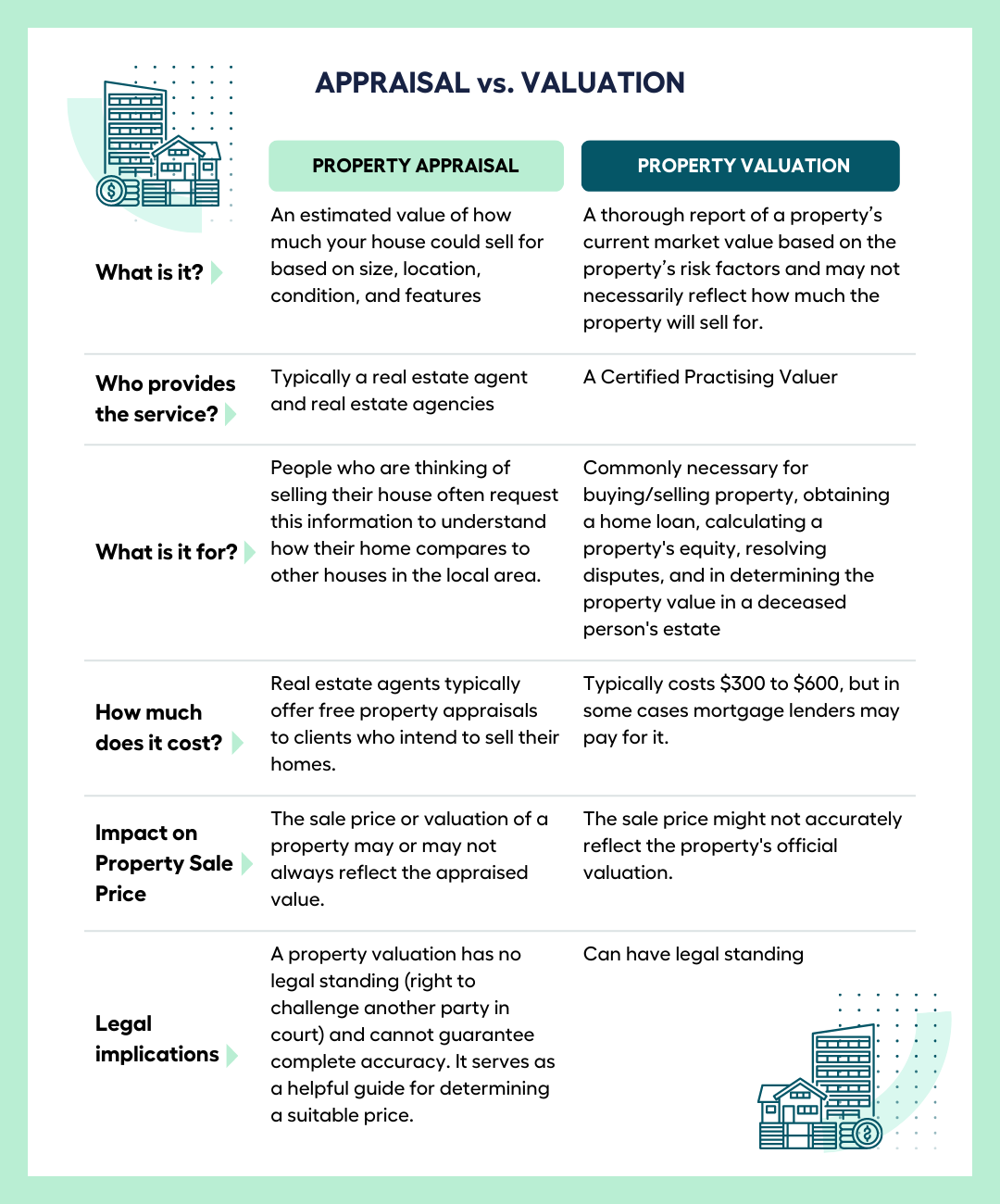Selling a property or simply wanting to know its value can be an exciting but confusing task.
How do you determine the right price?

Knowing how much your home is worth is like having a financial secret weapon. If you want to sell, refinance, or simply monitor your wealth, knowing how to estimate your home’s value is the first step you can take.
In this article, we’ll break it down for you in simple terms so you may confidently explore the world of property values in Australia.
Let’s jump in!
Jump straight to…
Finding Your Home Value
Although it can be challenging, figuring out the worth of your house is an essential step in managing your finances. Estimating your property value is the first step to take whether you want to sell it, refinance your mortgage, or just have a better grasp of your financial condition.
In order to help you make financially responsible decisions, we’ll discuss ways for estimating the value of your house in this post.
Where to Find Accurate Property Data
To obtain an accurate estimate of your property value, you need access to reliable property data. Fortunately, there are a few places where you can find land and property information.
One of the most commonly used sources is online property valuation websites. These websites use algorithms and the latest data from various sources to provide estimates of property values based on factors like location, size, and recent sales activity in the area. While these estimates may not be exact, they can give you a good starting point.
Here are some credible sources of accurate property data in Australia:
1. Lendi
Lendi is primarily an online platform where you can also get a property value report if you want to know how much your property is worth.
2. Domain
Domain is a real estate platform that offers various tools and resources to assist individuals in buying, selling, and renting properties. One of the services provided by Domain is property value estimates with full history for any building, street or suburb.
3. Realestate.com.au
If you’re wondering how much your property’s worth, realestate.com.au claims that their platform’s realEstimate™ feature can provide your estimated property value in less than a minute.
It describes realEstimate™ as “a computer-generated number that gives an idea of a property’s value generated by PropTrack, a company owned by realestate.com.au”.
PropTrack is a cloud-based valuation platform that provides digital valuation tools or property data access to give you a comprehensive picture of the residential property market.
PropTrack touts that its expert team of property economists provides a deep grasp of the economic factors that shape the Australian housing market, enabling you to make the best decisions possible.
Speaking of property insights, if you’re a data nerd who wants to do a deep dive into statistics, take a look at these property data resources…
4. CoreLogic
CoreLogic, is a provider of property data and analytics that specialises in collecting, analysing, and delivering accurate and up-to-date data on properties across Australia. Think of them as the Aussie wizards of real estate information.
CoreLogic aggregates information from multiple sources, including real estate agents, government records, and public data to develop a comprehensive property database. They provide a treasure trove of information, including historical property sales data, property characteristics, market trends, and suburb insights.
You can access CoreLogic’s available data through online platforms, reports, and tools to help you learn about estimated property values, research market trends, and gain valuable insights into the Australian property market.
5. Statista
Statista is a platform for market research, statistics, and data analysis. It provides a wealth of information across various industries and topics, including real estate. You can find Statista editor’s picks on current real estate statistics in Australia on this page.
How do you determine fair market value?
Understanding the idea of fair market value is crucial when determining the value of your home.
In an open and unrestricted market, fair market value is the price that a willing buyer and a willing seller would agree upon. It represents the price at which, given the state of the market, your house will probably sell.
Considerations for determining fair market value include location, size, amenities, condition, and recent sales of comparable houses in the neighbourhood.
Here are 2 ways to figure out the fair market value of a property:
1. Property appraisal
A real estate agent can conduct an appraisal by assessing the property and giving an estimated value range. While it’s not the final say, this appraisal can be helpful for negotiations and reaching an agreement.
2. Property valuation
In Australia, a Certified Practising Valuer can perform a detailed valuation for a fee. They will inspect the property, research the local market, and provide a thorough property report on its current market value.
Usually, lenders require a property valuation before approving a home loan. Buyers and sellers may also seek a valuation to get an unbiased opinion before making decisions. It can be useful for matters like tax, insurance, or family settlements.
How to Complete a Property Valuation: A Step-by-Step Guide
Step 1
Find Recent Local Sales
Comparing a property to others that have recently sold in the same neighbourhood is the first step in determining its value. Look for recent sales that have occurred within 1 kilometre for cities or more for regional areas.
Check to see if the properties you’re looking at are comparable to the ones you’re valuing. A list of sales is available on websites like CoreLogic RP Data, as well as in the sold properties section of real estate portals. Remember to sort the outcomes according to the most recent sales.
Step 2
Assess Comparability
Focus on the properties that are most similar to the one you’re valuing.
Pay attention to the following features:
1. Location: Is it the same distance from amenities and transportation, and do the streets have a similar appearance?
2. Size: Are the land area and living area similar?
3. Rooms: Do they have the same number of bedrooms, bathrooms, and car spaces?
4. Quality: Are the properties of a similar standard?
It’s important to compare properties that closely resemble the one you’re valuing to ensure the data’s accuracy. If you haven’t been inside the properties, you can drive past the property or look for old listings with photos online to get an idea.
Step 3
Determine Superiority or Inferiority
Once you have a list of 3-5 similar properties, evaluate which ones are superior and which ones are inferior to the property you’re valuing. Try to be objective or seek input from a to help you decide.
Consider factors like:
- Location
- Land area
- Living area
- Parking
- Views
- Standard of finishes.
Bank valuers typically evaluate the land and building separately and determine which is better overall. This will provide you with a range for your property’s estimated value.
Step 4
Account for Market Conditions
Sales from more than three months ago may not accurately reflect current circumstances in a competitive market. To take market changes into account, make minor adjustments to your estimated value. You probably have a good understanding of the market in your area if you’ve been actively participating in open houses and auctions.
If you want to take the property estimate process to the next level, consider seeking the guidance of a property expert in Australia to avoid the hit-and-miss approach.
Want to know more about all things Property?
Listen to the Australian Property Show Here!

Or Book a FREE 15 min Call and ask us your questions today.
Is an appraisal the same as fair market value?
Although the terms “appraisal” and “fair market value” have become commonly used interchangeably, they have distinct meanings.
A property appraisal is when a real estate agent gives a professional opinion on how much a property is worth. During this process, a real estate agent will compare your property to others in the area using recent sales data and your home’s features. It’s like a sneak peek into how much your property could potentially sell for.
The best part?
Most real estate agents offer this service for free. If you’re considering listing your property soon, a property appraisal can give you a good idea of what you can expect to get from the sale.
But here’s the thing:
An appraisal is not a legal document (holds no legal standing), so it’s not set in stone. It’s more like a general idea or an estimate of the property’s value. Some agents might offer a free appraisal just to win you over in hopes of getting a sale.
Here’s the catch though:
Not all agents are qualified to do appraisals, and some agents might not have the same level of expertise as others. Therefore, before you solely rely on an agent’s appraisal, take a moment to check their qualifications and experience. It’s always good to have someone who knows their stuff!
On the other hand, the fair market value of a property is basically how much it’s worth if you were to sell it.
To figure this out, a Certified Practising Valuer, who is an expert in property values, gives their professional opinion on what the property is worth in the current market. They consider factors like location, condition, and recent sales of similar properties. Therefore, the fair market value is the estimated property value based on their expertise and knowledge.
What’s the difference between an appraisal and a valuation?
Like what was explained in the previous section, a property appraisal refers to the estimated value of a home, typically conducted by a real estate agent, in order to come up with an approximate selling price.
But if you want an accurate and precise understanding of your property’s worth, a property valuation is the way to go. Unlike an appraisal, a valuation is a formal process that involves a certified practising valuer visiting your home who will provide a property valuation report.
According to the Australian Taxation Office (ATO), valuation reports need to have all the important information so that people can understand how the value of a property was determined. They should clearly show how the final conclusions were made to give strong and convincing evidence to support those conclusions.
In order to provide a robust property valuation report, the valuer will visit your property and undertake a comprehensive evaluation, considering factors such as:
- Location
- Land size and house size
- Layout, aspect, and topography
- Features of the house, such as the number of bedrooms and the modernised design
- Building structure and condition
- Zoning by council
- Heritage status
- Damage and faults
- Planning restrictions
- Caveats or encumbrances
- Accessibility to the property
Valuers typically work independently but on behalf of banks and lenders. Unlike a property appraisal, a valuation does not account for factors like street appeal and stylish features. Additionally, the cost of renovations may not be reflected in the property’s estimated value.
Please note that property valuations do not determine the exact selling price of a property. Actual sales prices can vary significantly, influenced by factors such as emotions, interest, and competition in the market.
Why would you need a property valuation?
1. Property settlement
During divorce or separation, a property valuation helps determine the fair distribution of assets.
2. Home loan
Lenders require property valuations to assess the collateral value for approving a home loan.
3. Equity calculation
When assessing the equity in a property, a valuation provides an accurate value for calculation.
4. Dispute resolution
In legal or financial disputes, a property valuation offers an impartial assessment of the property’s worth.
5. Deceased estate settlements
A property valuation is needed for deceased estate settlements to ascertain the accurate property value for the particular purpose of determining tax obligations for the assets you inherit, distributing assets among beneficiaries, and ensuring a fair and equitable distribution of the deceased’s estate.
How much do property appraisal and property valuation cost?
Most real estate agents offer free property appraisal services when you’re thinking of selling your home. A listing price will be suggested by an agent based on the opinion of the agent of how much your house is worth.
It’s important to know that different agents might give different appraisal dwelling values. However, if their appraisals are similar and fall within a small price range, it’s a good indication that the suggested property value is probably accurate.
On the other hand, a fee is charged for a property valuation service, with costs typically falling within the range of $400 to $600.
But the fees can vary based on where you live, how big your property is, and other factors. If you live outside the city, it might be a bit more expensive because the valuer has to travel.

Whether you’re planning to sell your property or need to determine its worth for other reasons, understanding property appraisal and valuation is essential. While an appraisal provides an estimated worth of a property, a valuation offers a detailed report by a qualified professional. Keep in mind, though, that valuations don’t consider certain factors and won’t dictate the final selling price. However, both methods are invaluable tools in various situations.
If your intent in determining the value of your home is to benefit your family in various aspects of financial planning, consider taking a look at the advantages of a family trust.
Advantages of a Family Trust
Did you know that using a family trust when assessing the value of your house can bring you some advantages?
A family trust is like a special legal shield that holds ownership of assets, such as properties, for the benefit of your family members.
By putting your property into a trust, you can actually protect it from certain legal claims which can translate to less stress and worry about potential issues.
And here’s another perk:
A family trust can help you reduce the amount of taxes you might have to pay.
Who doesn’t love saving money, right?
But that’s not all.
With a family trust, you can plan ahead and smoothly pass on your wealth to future generations. It’s like setting up a smart strategy for your family’s financial future.
So, you may want to consider using a family trust when dealing with your property value. It’s a prudent move that brings you benefits and peace of mind.
Curious about the potential value of your home? Book a FREE 15 min Call or Send Us Your Questions!






